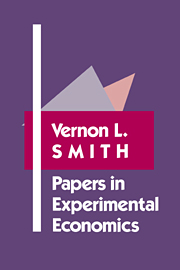Book contents
- Frontmatter
- Contents
- Preface
- Acknowledgments
- Part I The Formative Years
- Introduction
- 1 An Experimental Study of Competitive Market Behavior
- 2 Effect of Market Organization on Competitive Equilibrium
- 3 Nature, the Experimental Laboratory, and the Credibility of Hypotheses
- 4 Experimental Auction Markets and the Walrasian Hypothesis
- 5 Experimental Studies of Discrimination versus Competition in Sealed-Bid Auction Markets
- 6 Experimental Economics: Induced Value Theory
- 7 Bidding and Auctioning Institutions: Experimental Results
- 8 Intertemporal Competitive Equilibrium: An Empirical Study of Speculation
- 9 Experimental Economics at Purdue
- Part II Institutions and Market Performance
- Part III Public Goods
- Part IV Auctions and Institutional Design
- PART V Industrial Organization
- Part VI Perspectives on Economics
8 - Intertemporal Competitive Equilibrium: An Empirical Study of Speculation
Published online by Cambridge University Press: 06 July 2010
- Frontmatter
- Contents
- Preface
- Acknowledgments
- Part I The Formative Years
- Introduction
- 1 An Experimental Study of Competitive Market Behavior
- 2 Effect of Market Organization on Competitive Equilibrium
- 3 Nature, the Experimental Laboratory, and the Credibility of Hypotheses
- 4 Experimental Auction Markets and the Walrasian Hypothesis
- 5 Experimental Studies of Discrimination versus Competition in Sealed-Bid Auction Markets
- 6 Experimental Economics: Induced Value Theory
- 7 Bidding and Auctioning Institutions: Experimental Results
- 8 Intertemporal Competitive Equilibrium: An Empirical Study of Speculation
- 9 Experimental Economics at Purdue
- Part II Institutions and Market Performance
- Part III Public Goods
- Part IV Auctions and Institutional Design
- PART V Industrial Organization
- Part VI Perspectives on Economics
Summary
In his prologue to the theory of speculation, Samuelson (1966a, p. 947 and passim) deals exclusively with the case of “foreseen changes in future supply and demand” in outlining a theory of intertemporal competitive price-quantity equilibria in markets that are subject to speculation. The analysis was considered to be a preliminary step to the more complicated cases involving uncertainty. Modern extensions of the theory (Mandelbrot, 1971; Samuelson, 1972; Schimmler, 1973) to include uncertainty have been accompanied by such vestiges of this original “perfect knowledge” model (e.g., common, well-defined expectations) as demanded, perhaps by the limitations of mathematical machinery and imagination for restructuring the theory.
Samuelson provides an extension to intertemporal markets of the assumption made by some writers that “perfect” knowledge in the sense of foreknowledge of market supply and demand is a precondition for competitive equilibrium in stationary markets. However, it is now well established by many experimental replications that knowledge of market supply and demand is not a necessary and may not be a sufficient condition for classical competitive equilibria to be achieved when a stationary market is organized under auction rules. Such knowledge is not necessary because in experiments in which subject participants know only their own supply and demand valuations contract prices demonstrably converge to or deviate only slightly from the theoretical equilibrium (Smith, 1974, pp. 7–15); knowledge of supply and demand may not be sufficient because under supply and demand conditions in which the entire exchange surplus is received by buyers (and all subjects are informed of these conditions), equity c onsiderations seem to retard and in some instances may preclude convergence to the classical (i.e., no externalities) competitive equilibrium (Smith, 1975, pp. 11—12).
- Type
- Chapter
- Information
- Papers in Experimental Economics , pp. 128 - 153Publisher: Cambridge University PressPrint publication year: 1991



